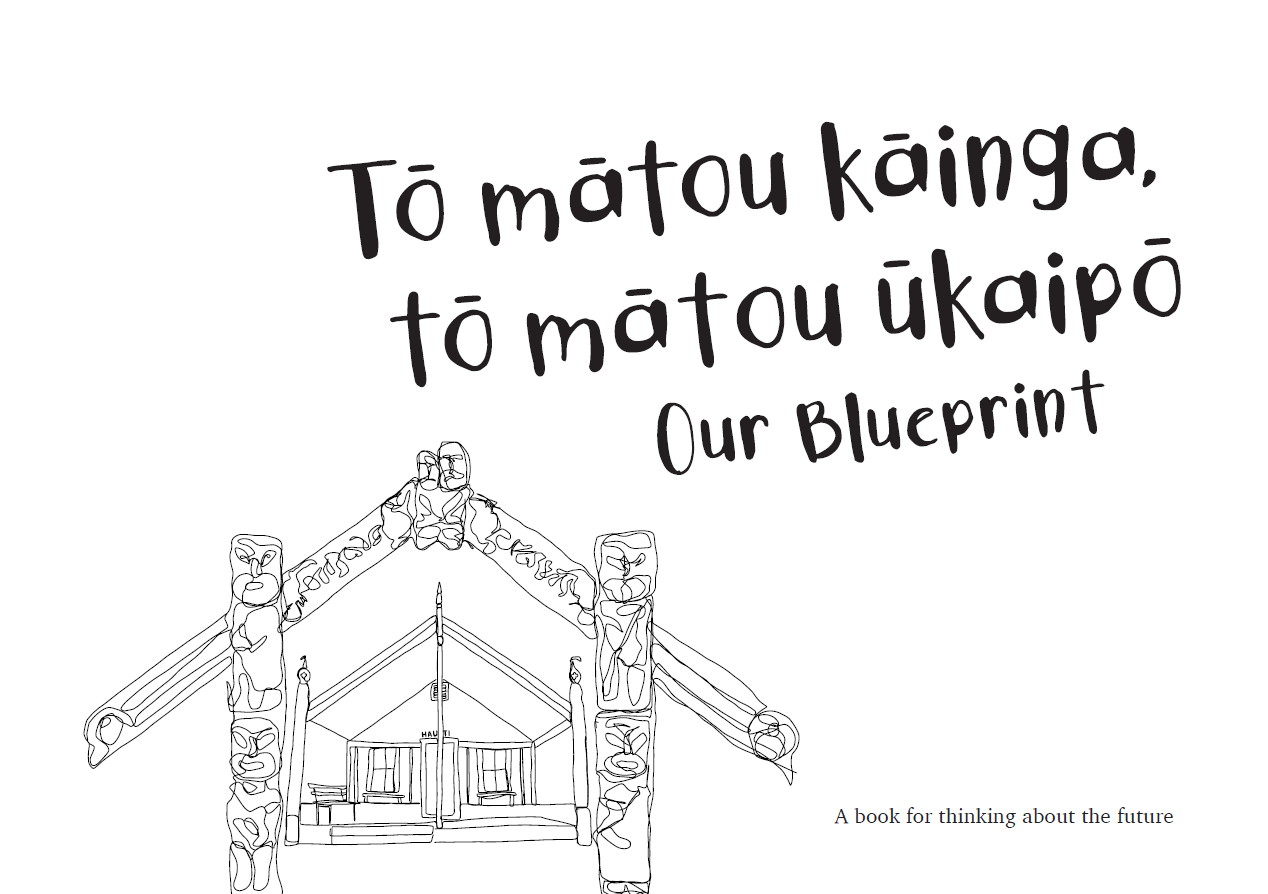
The kāinga team have spent the last couple years engaging with whānau, iwi, community leaders, housing and design specialists, students and architects to all answer the question – What does home mean to you? What makes a house a home?

The Regional Rangahau and Primary Health Care Symposium was held in Whanganui on 30 September 2025. This targeted, invitation-only event brought together 25 Māori primary health care service managers, practitioners and researchers from across Te Ranga Tupua as well as National Hauora Coalition representatives.
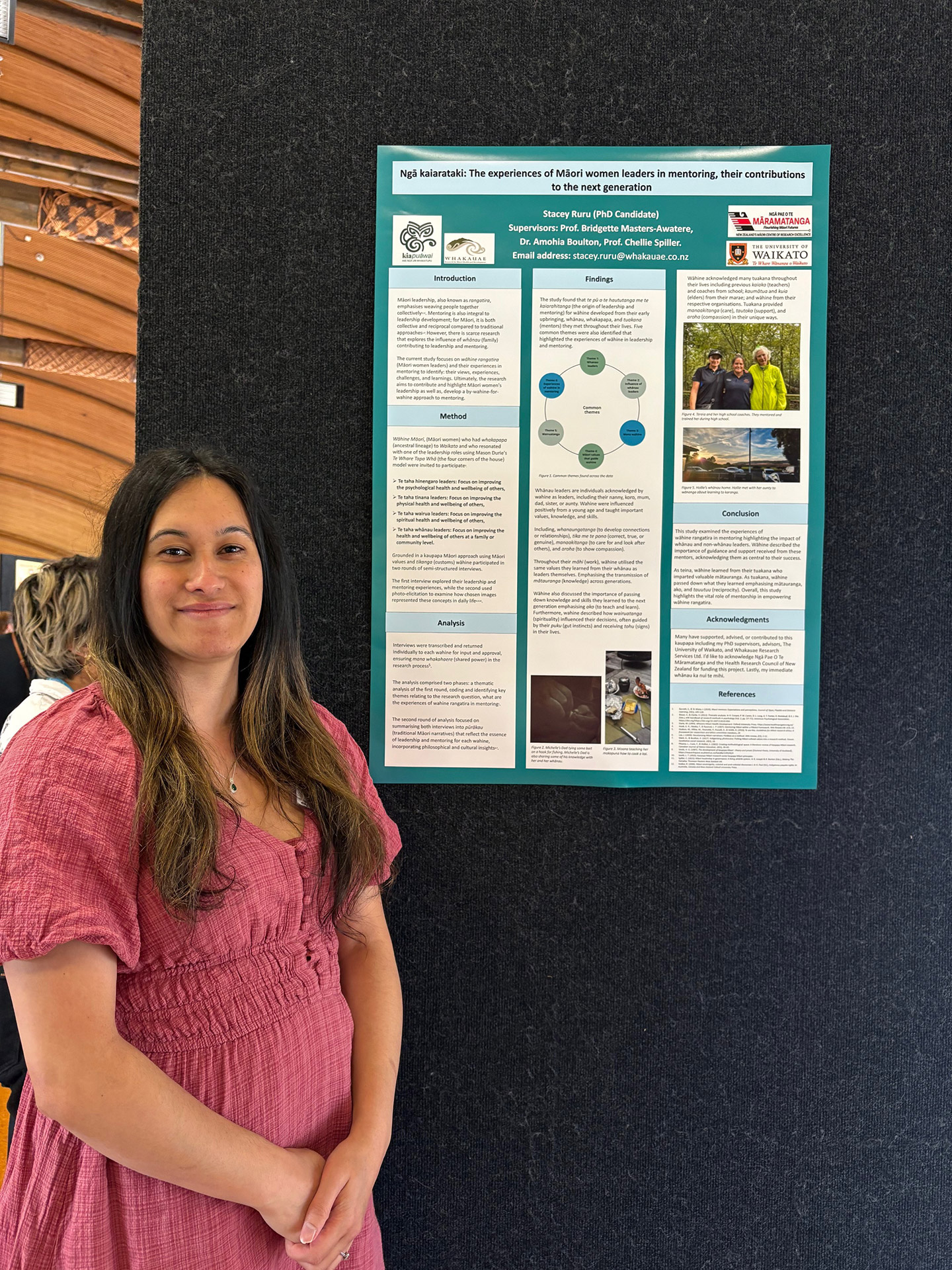
Stacey Ruru, in her final year of her PhD shares her reflections on the thesis process and her research journey.

On the surface 3D animation and game design and the world of research have little in common. However, AUT animation and game design student, Hakopa Ririnui, has proven these two worlds can collide successfully to communicate research data through visual storytelling. Hakopa created a 3D animation entitled 'Te Hau Kāinga o Āpōpō’ - a stunning visual representation of whānau and stakeholder perceptions of what housing and home could be in the future based on participant feedback from our Tō Mātou Kāinga, Tō Mātou Ūkaipō project.
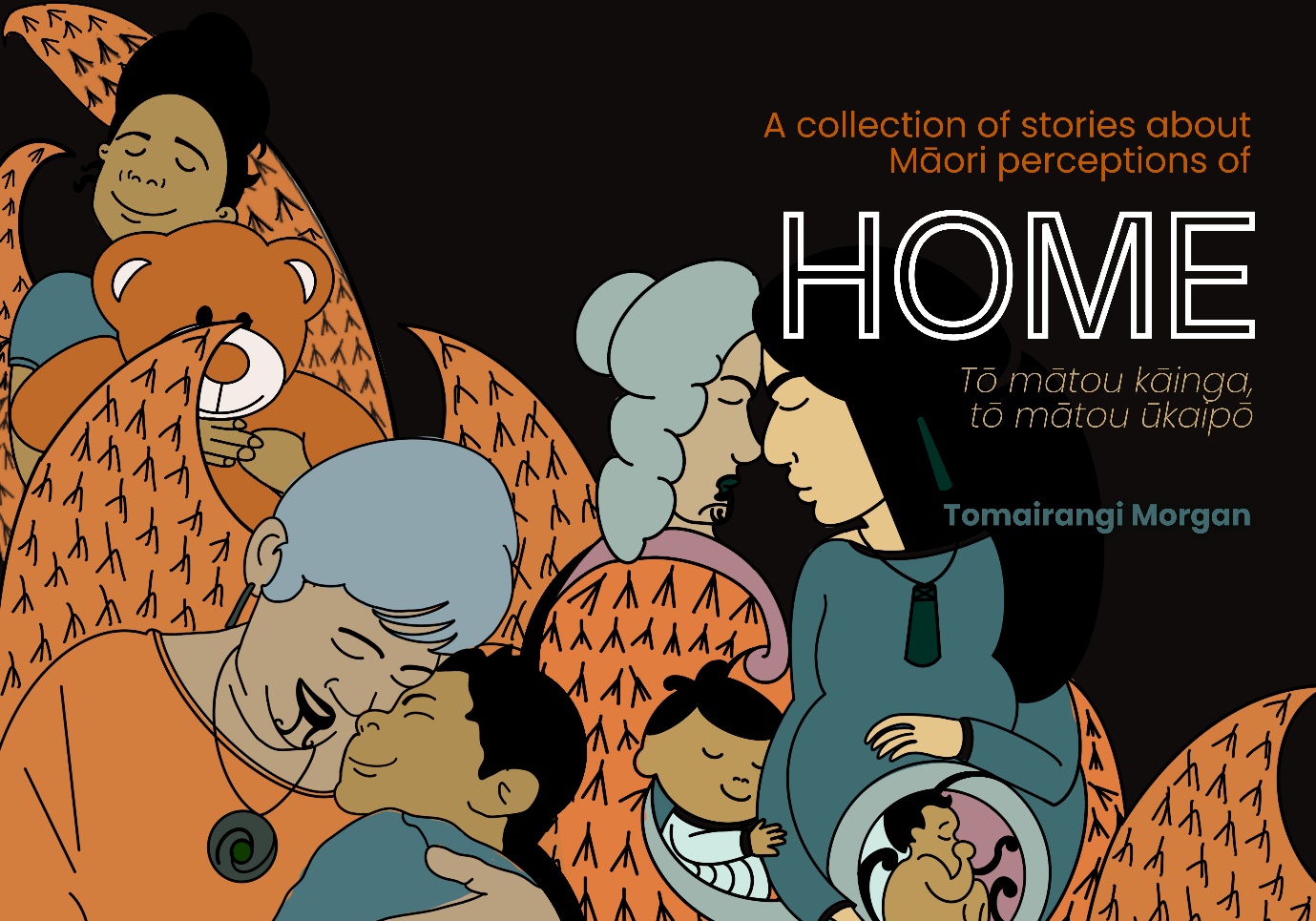
In the recently published paper ‘Reclaiming the threads: Re-Narrating Māori stories in new spaces’, our Translation, Uptake and Impact (TUI) project team showcased how the translation of Māori research data into innovative formats and spaces can open research communication to much broader audiences - including Indigenous communities and other key stakeholders – through an award-winning collaboration with Māori creative students.
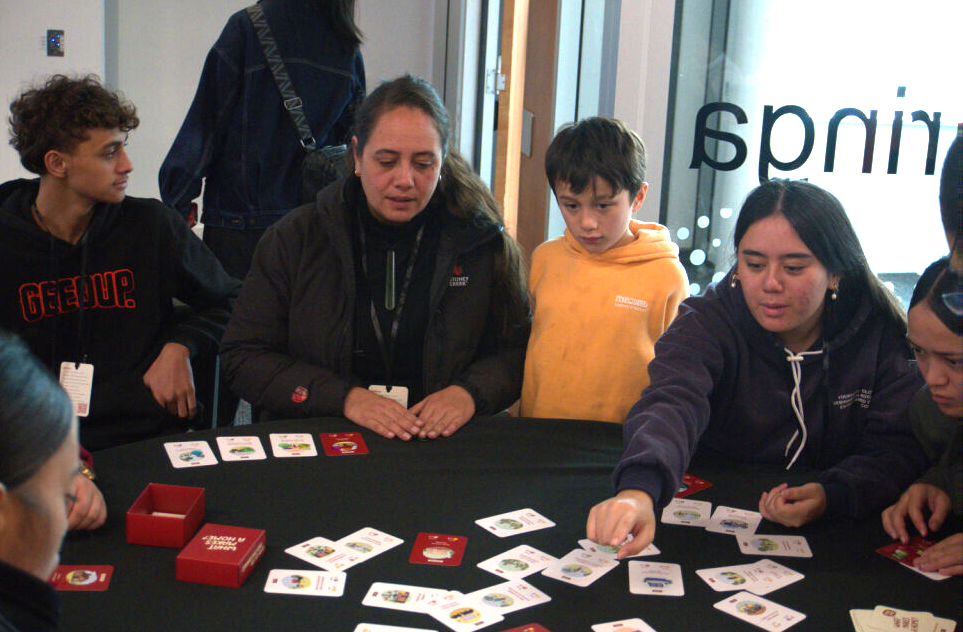
The Re-imagining Māori and Home Symposium - held on 17 July 2025 at AUT City Campus in Auckland - brought together researchers, practitioners, rangatahi, and community leaders to explore innovative housing solutions grounded in Māori perspectives. Hosted by Whakauae Research, AUT Taupua Waiora Centre for Māori Health Research, and Design for Health, the one-day event was a powerful space for sharing whakaaro, creative problem-solving, and action-focused kōrero.
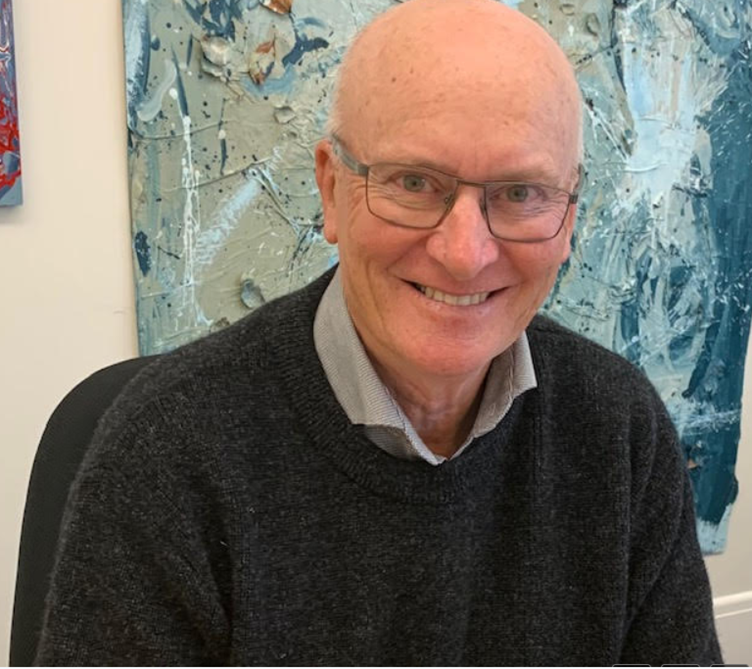
Following two successful mid-winter conference presentations, our He Waka Eke Noa research team is now preparing to host a spring symposium. Sharing research results with diverse audiences for maximum impact is the driver for all three of these events.
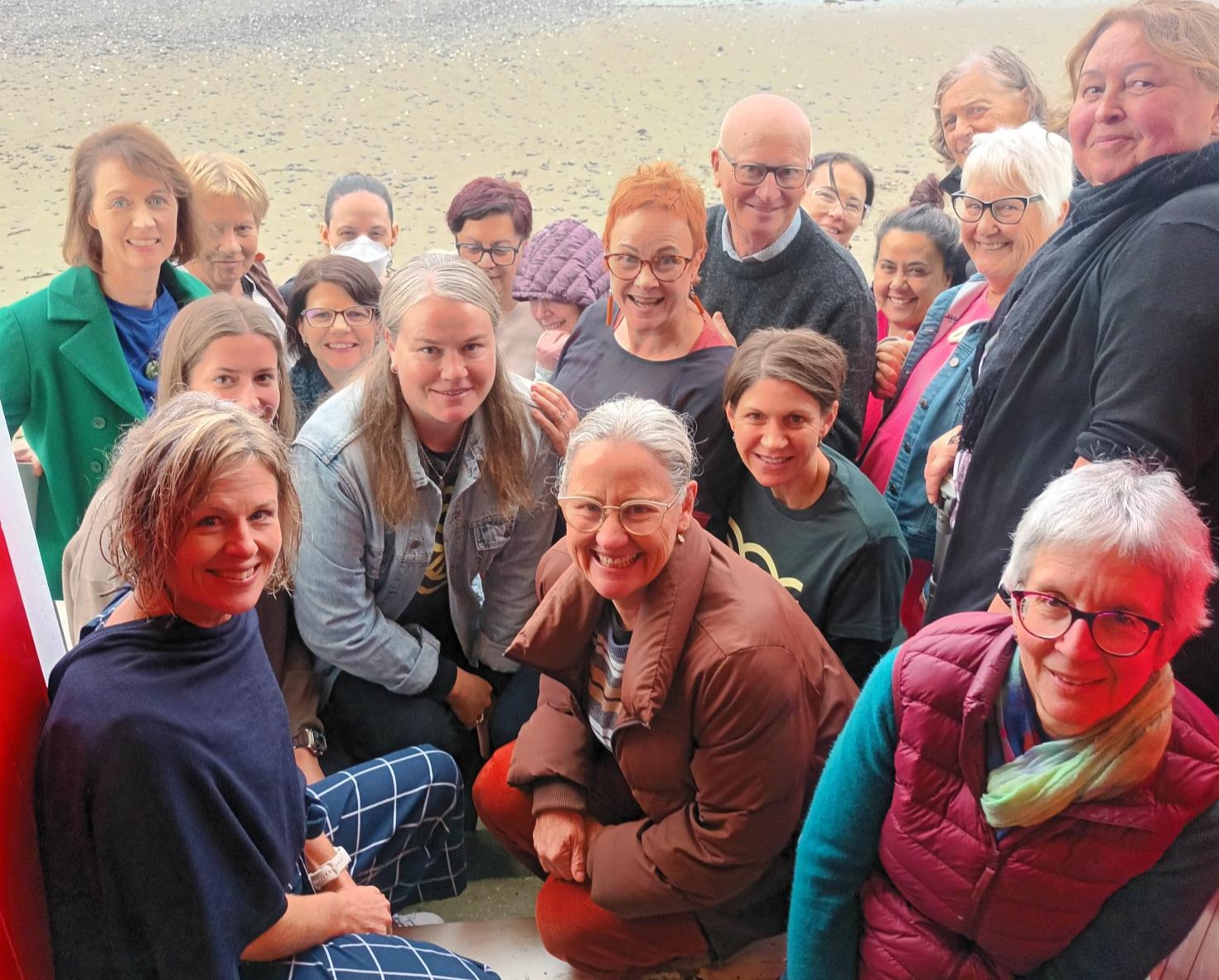
The He Waka Eke Noa research team and the Cancer and Chronic Conditions (C3) Research Group (University of Otago, Te Whanganui-a-Tara) recently co-hosted a cancer-related qualitative research hui. Taupuhipuhi Kairangahu Tautoko brought together a group of invited kairangahau, most of whom have worked together on various mahi over a number of years. The hui offered a creative space to share current research progress and discuss collective aspirations for matepukupuku-related qualitative research. Learn more here.
.png)
At the RIEL 2025 Conference in Santa Ana Pueblo, New Mexico, the Rapua Te Ara Rangatira team presented Te Remu Huia: Reclaiming Knowledge of the Huia Bird for Tribal Governance, highlighting the significance of the extinct manu huia to Ngāti Hauiti and the kaupapa Māori research journey to restore cultural knowledge for iwi leadership and succession planning. Through reflections on mātauranga Māori, Indigenous governance, and co-design with the Rūnanga, the team shared insights into reclaiming traditional knowledge systems to strengthen tribal futures.

Te Korowai Aroha ki te Tangata, the Gonville Health co-design initiative, moved into a new phase in early April. Gonville Health Working Group members have co-designed a three-phase change model which they began to action in February 2025. The change model focuses on the clinic’s physical environment, communication and culture and clinical practice.

Raumati has been a busy and productive season for the Rapua Te Ara Rangatira project, marked by significant developments and milestones, as well as challenging yet rewarding mahi at the flaxroots. This update provides the latest news for Te Remu Huia, covering recent wānanga in November 2024 and March 2025, with Te Rūnanga o Ngāti Hauiti (TRONH), as well as ongoing and upcoming dissemination outputs.

Hakopa is developing a digital artefact that visually communicates key themes emerging from Kia Puāwai’s Tō Mātou Kāinga, Tō Mātou Ūkaipō research project. Tō Mātou Kāinga explores the meaning of home through a te ao Māori lens, providing the foundation for Hakopa's creative exploration in mediums such as moving image and animation. Learn more in this update from the team.

Following a late 2024 hui, six whānau members joined the Gonville Health Working Group, bringing fresh energy and a shared commitment to positive change. Together with Gonville Health staff, they are driving a three-point change model to improve service accessibility for Māori, guided by insights from the He Waka Eke Noa study. With strong support from the research team and Whanganui Regional Health Network, progress is reviewed monthly. In February 2025, the Group explored uplifting programme names inspired by whakataukī, with a final decision set for April. Momentum is building, and the future looks bright for whānau-centred care at Gonville Health.

The research team of Tō mātou kāinga were lucky to have an amazing summer scholar join us for 10 weeks in January. Hannah brought fresh perspectives and talent to our team and has a growing passion for research and they're already making valuable contributions to our work. We're excited to share part of their journey and insights in this interview.

Tō Mātou Kāinga team publishes new article on Māori narratives of home and place - Belonging to the Land: Indigenous Māori Narratives of Home and Place

The International Indigenous Research Conference (IIRC) took place at Waipapa Taumata Rau (University of Auckland) from November 12 to 15, 2024. The event attracted over 600 participants. The conference theme, “Whītiki Taua” (research solidarities), brought Indigenous communities and nations together to present their research projects, encouraging reflection, sharing, and inspiration.

We were delighted to welcome six whānau members to a hui with Gonville Health on 26 November 2024. They represented four of the whānau participating in the He Waka Eke Noa study. All six were keen to talk with staff about their aspirations for Gonville Health captured in the Moemoeā o Ngā Whānau booklet created in the Dream Phase of the study. This was the first time that the booklet had been shared with Gonville Health staff and was a high point of the hui. Whānau felt that as Moemoeā o Ngā Whānau captures their stories and their voices it would best be shared with Gonville Health by them directly rather than through the research team.

The Design Phase of our study gathered momentum in November 2024 when Gonville Health members of a newly formed working group met to discuss the next stage of the research. Later this month (26 November) the Gonville Health members will be joined by whānau who are keen to contribute to the group’s mahi. This combined working group will champion the co-design of changes at Gonville Health inspired by the kōrero of whānau and staff. The working group aims to enhance whānau access to, and engagement with, Gonville Health.

Rapua researchers Amohia Boulton, Utiku Potaka, and Luke Enoka attended the US Indigenous Leaders Symposium at Parliament in Te Whanganui-a-Tara on Tuesday 29th October 2024. Te Ātiawa, Ngāti Toa, and Rangitāne ki Manawatū hosted the event, bringing together Indigenous leaders to share insights.

Whanganui turned on the sunshine once again as Whakauae welcomed and hosted 23 researchers for the annual hui of the Kia Puāwai Ake Ngā Uri Whakatupu (Kia Puāwai) full research team on 22nd and 23rd October 2024.

This winter, the TUI team had the privilege of collaborating with a talented group of students who brought bold creativity and unique perspectives to the creation of a significant piece: the animated TUI video. Led by Tomairangi Morgan (Ngāti Uenukukōpako, Te Roro o Te Rangi), this project came to life through the combined efforts of a diverse team of Bachelor of Design students from AUT - Hakopa Ririnui (Ngāi te Rangi, Ngāti Ranginui, Ngāti Pūkenga), Sala Deng, Jessica Ryou, and Levena Hou.

Now in its third year, the Tō mātou kāinga, tō mātou ūkaipō study continues to analyse the voices of numerous participants who have shared their stories on home and housing. Insights into the diverse experiences, needs, and aspirations from across Aotearoa reveal a range of shared themes, including those emerging from interviews with wāhine in the Hauraki region. The voices of participants from Hauraki highlighted intergenerational reflections on what home means, emphasising that it goes beyond physical shelter to encompass cultural identity, whānau, and connections to whenua.

Many of us remember the joy of choosing which WordArt font we would pick for our primary school projects. However, for Cassie Khoo this joy was found in Adobe Illustrator, or Adobe Freehand as it was called back when she began learning the programme in Year Four. Cassie’s Mum, a graphic designer herself, taught Cassie the basics of the programme for use in her school projects. This impacted Cassie’s interest in design very early in her life.

Our research findings were a starting point for recent conversations with health service providers within our region. Whānau aspirations for primary health care services were centre stage in this kōrero. The research team initially met with Ngā Kaitakitaki Hauora (NKH), in early September. NKH is made up of Māori health service provider senior managers from around the rohe including the Waimarino, the northern and southern Rangitīkei, and Whanganui. We shared Dream Phase study findings highlighting what works for whānau who are on a cancer journey and are patients at Gonville Health.

Members of Whakauae Research Services Ltd were pleased to support WRS staff member Luke Enoka recently when he presented at the Holders of Our Knowledges and Keepers of Our Stories Symposium, in Melbourne, Australia.

He Waka Eka Noa presented at a Matariki Rangahau Series 2024 event in Pōneke. The theme of the event was Mana Wahine - celebrating the strength and leadership of women in health research.

National Hauora Coalition colleagues, Dr Rachel Brown (Tumu Whakarae, National Health Coalition) and Donna Kielar (Director of Nursing, National Hauora Coalition) joined us in Whanganui recently where we welcomed Donna as a newly appointed member of our He Waka Eke Noa Research Advisory Group.
.jpeg)
Members of the Rapua te Ara Rangatira team met in July to wānanga, prepare presentations, and work on a range of dissemination outputs from the project.

The He Waka Eke Noa team is now wrapping up the Dream Phase (Phase 2) of our four phase Kaupapa Māori Appreciative Inquiry (KMAI) research project. We’ve been checking our analysis of Dream Phase data with our co-design research participants; whānau enrolled with Gonville Health primary care service and Gonville Health staff.

Systems thinking is a way of looking at the world that recognises the interconnectedness of both natural and human-made systems. Through the Kia Puāwai programme we have been able to explore what our own systems change framework might look like – a framework to help us guide our aspirations to use the Kia Puāwai research as an agent of change.
.jpg)
As we, the Tō mātou kāinga research project team transition to the next project phase, we were lucky to host a home and housing wānanga with Te Rūnanga o Ngāti Hauiti in early May. This gathering served as a platform for meaningful dialogue and collaboration, as we collectively strive to begin conversations about what a housing strategy for Ngāti Hauiti may look like in the future. In this wānanga we got to explore with the Rūnanga – what could Hauiti look like in 2060? What are Hauiti stories about home? What would a dream papakāinga look like? There was a beautiful exchange of ideas and sharing of kōrero that will undoubtedly enrich our research endeavours and begin crucial planning in this space.

At its first quarterly strategic hui at Rātā marae, held on 24th of February 2024, Dr Amohia Boulton, Utiku Potaka, and Luke Enoka, members of the Rapua te Ara Rangatira research team premiered an animated film outlining the governance and leadership research being conducted with Ngāti Hauiti.

On November 25, 2023, at Rātā marae, Lead Researcher Dr. Amohia Boulton and Senior Researcher Utiku Potaka provided an in-depth update on the Rapua te ara Rangatira study to Te Rūnanga o Ngāti Hauiti. The session concluded with the official launch of the first publication from the study, Rapua te Ara Rangatira, Kia Hikitia Ai Te Oranga: Interim Findings.
.jpg)
What happens when you take a roopu of rangatahi, expose them to research on identity, politics and leadership, housing, media and Māori health and ask them to come up with a way to kōrero about politics? Turns out that you get some amazing whakaaro on things that matter to rangatahi, and views on what it means to ‘be political’.

The Kia Puāwai research team, with representatives from all four projects, came together in Whanganui on the 18th and 19th October 2023, for our annual wānanga to:
- reflect on the previous year’s progress,
- explore opportunities for moving forward,
- talk about systems change within the context of each research project,
- discuss integration of research results, and
- update their individual project evaluation frameworks.

There have been some great outcomes in the first 18 months of our He Waka Eke Noa study. A first for us was developing and acting in our own short video introducing the research to you all. Thank goodness we have willing members of our whānau who were willing to jump in, take starring roles and help make our video shine! The short video can be viewed on this website.
.png)
When I look back on my life, I reflect on the people who made me. It is obvious to say that “my whānau knows me best”, but there are so may outside perceptions and expectations that shape who we are, many of which – for a young Māori male – have meant navigating through a sea of racist, homophobic, discouraging, and exclusionary environments, and which shape our political landscape here in Aotearoa.

Rapua Te Ara Rangatira explores what's required to develop and support excellence in iwi leadership, governance and decision-making. We contend that if we strengthen our governance, decision-making and leadership skills, abilities and processes at the iwi and hapū level, this will have positive, flow-on effects into other systems (e.g. the health sector), at a time when strong Māori leadership is critical to achieving positive outcomes for Māori.

The TUI team (Translation, Uptake and Impact) has dedicated its first year of research to operationalising a TUI model for research uptake and impact with its internal research team. Taking a systems perspective, and using an emerging Whakauae systems change model, we identified a need to secure entry points for aspiring Kaupapa Māori researchers where our current capacity to do research is limited. The TUI team is testing a new way of working with upcoming tauira, current undergraduate Māori students as part of the Whakauae Winter Studentship in 2023.
.jpg)
Currently studying Creative Writing and te reo Māori at Te Wānanga Aronui o Tāmaki Makaurau (AUT), Tomairangi brings her unique skills and critical rangatahi-lens to the Tō mātou kainga, tō mātou ūkaipō - Whānau conceptions of home, creating safe and healthy home environments research project as part of a Studentship with Whakauae Research and the Kia Puāwai program.

Tō mātou kāinga, tō mātou ūkaipō is a research project that is talking to whānau across the motu to hear their voices, hopes, dreams and solutions towards understanding the diversity of what whānau need and want in a home environment.

Saffron Stanley is one of our Winter Studentship recipients working on a project for Kia Puāwai.
"To me, a flourishing 2050 for Māori is underscored by the overall aspiration of mana motuhake, where our aspirations, needs, culture, and whānau networks are nurtured and met through Māori-led kaupapa. I envision a future where we are protected, heard, and empowered in all areas."

Ben joins the Kia Puāwai crew with his Whakauae Winter Studentship award.
"My passion for research is not only fuelled by my strong curiosity to delve into challenging and complex questions but also motivated by the urge to decolonise Aotearoa, tackle societal issues, and create groundbreaking solutions that enhance the wellbeing of our people."

Meet Jorja, who is working with our Winter Studentship crew for Kia Puāwai.
"Research to me is a powerful avenue to be critical. To unpack and dismantle western theories and breathe new life into Indigenous stories. Sourcing the wisdom of our Tūpuna that informs us to move backwards into the future. Ka mua, ka muri."

Reuben is one of our latest Kia Puāwai Winter Studentship recipients.
"Throughout my academic journey so far, I have found great fulfilment in connecting my cultural heritage with my learning. Reflecting on the generational trauma and the impact of colonial rule on our people allows me to recognise the profound importance of research in addressing these issues. By engaging in research, I see an opportunity to contribute to the restoration of our sovereignty."
.png)
For tertiary students interested in getting some real research experience and working with senior Māori health researchers for three months during the 2023 winter, our studentship programme is intended to assist a student in their education and the development of their research skills. The award is contestable and based on merit and academic quality and supported by an academic supervisor. The studentship will provide experience and support for Māori students wanting to learn new skills and gain experience in game-changing research. Applications for the Studentship will be open from 27 March 2023 to 21 April 2023. To apply please send your CV, a reference from an academic supervisor and a covering letter to: sonja@whakauae.co.nz

He Waka Eke Noa is an authentic and active partnership between three distinct groups of interest; Whakauae researchers, whānau research participants and Gonville Health, a primary care practice in Whanganui.

"As a first year PhD student at the University of Waikato, I had the opportunity to develop a research proposal that extended my master’s work. My master’s thesis was based on how Māori women leaders-maintained wellness in leadership roles. I am now undertaking PhD research which will investigate the experiences of Māori women in leadership and mentoring before, conceptualising a framework for future leaders."
.png)
The Whakauae team have started on a journey looking at systems change and how our mātauranga Māori can be used to create a framework for how we think about and apply systems change in our Kia Puāwai programme grant.

Associate Professor Bridgette Masters-Awatere was recently awarded the Waikato DHB Medical Science Award, one of a series of awards presented annually by the Kudos Science Trust. The Kudos Awards are the only regional (Waikato) science awards in New Zealand and are seen as showcasing research excellence and cutting-edge science.